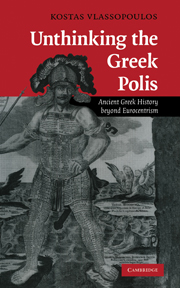Book contents
- Frontmatter
- Contents
- Acknowledgements
- Abbreviations
- Introduction
- PART I DEFINING THE CONTEXTS OF THINKING ABOUT THE POLIS
- PART II RETHINKING THE CONTEXTS. THE POLIS AS AN ENTITY: A CRITIQUE
- 4 East and West, Greece and the East: the polis vs. Oriental despotism
- 5 The consumer city: ancient vs. medieval/modern
- PART III BEYOND THE POLIS: THE POLIS AS PART OF A SYSTÈME-MONDE
- References
- Index
4 - East and West, Greece and the East: the polis vs. Oriental despotism
Published online by Cambridge University Press: 22 September 2009
- Frontmatter
- Contents
- Acknowledgements
- Abbreviations
- Introduction
- PART I DEFINING THE CONTEXTS OF THINKING ABOUT THE POLIS
- PART II RETHINKING THE CONTEXTS. THE POLIS AS AN ENTITY: A CRITIQUE
- 4 East and West, Greece and the East: the polis vs. Oriental despotism
- 5 The consumer city: ancient vs. medieval/modern
- PART III BEYOND THE POLIS: THE POLIS AS PART OF A SYSTÈME-MONDE
- References
- Index
Summary
As we have already discussed, the polis has functioned as a boundary mark to separate the history of the Greek communities from those of the Near East. This was accomplished through the construction of a contrast between the Greek polis as a community of citizens and Oriental despotism. This contrast is well entrenched in modern scholarship and will be challenged in this chapter, in an attempt to show that the juxtaposition misconstrues what it is to be compared and completely misrepresents the Near Eastern realities. There is then a clear need to reconsider this old dichotomy. Do we have any predecessors in our task?
There has already been some promising work, trying to overcome Orientalist dichotomies, but it has been mainly concerned with cultural and religious history; social, economic and political history has only recently begun to benefit from such a novel approach and still to a limited extent. Moreover, this kind of work has a certain limit. It argues for Oriental influences in ancient Greek culture and religion; it does not challenge directly the meaning of the two juxtaposed entities, and it does not attempt to write a ‘connected history’. I am trying to do something more challenging, yet still limited: my aim is a change of perspective. Instead of being the self-referent ancestor of the West, Greek history can be viewed within the changing history of the Eastern Mediterranean.
- Type
- Chapter
- Information
- Unthinking the Greek PolisAncient Greek History beyond Eurocentrism, pp. 101 - 122Publisher: Cambridge University PressPrint publication year: 2007



